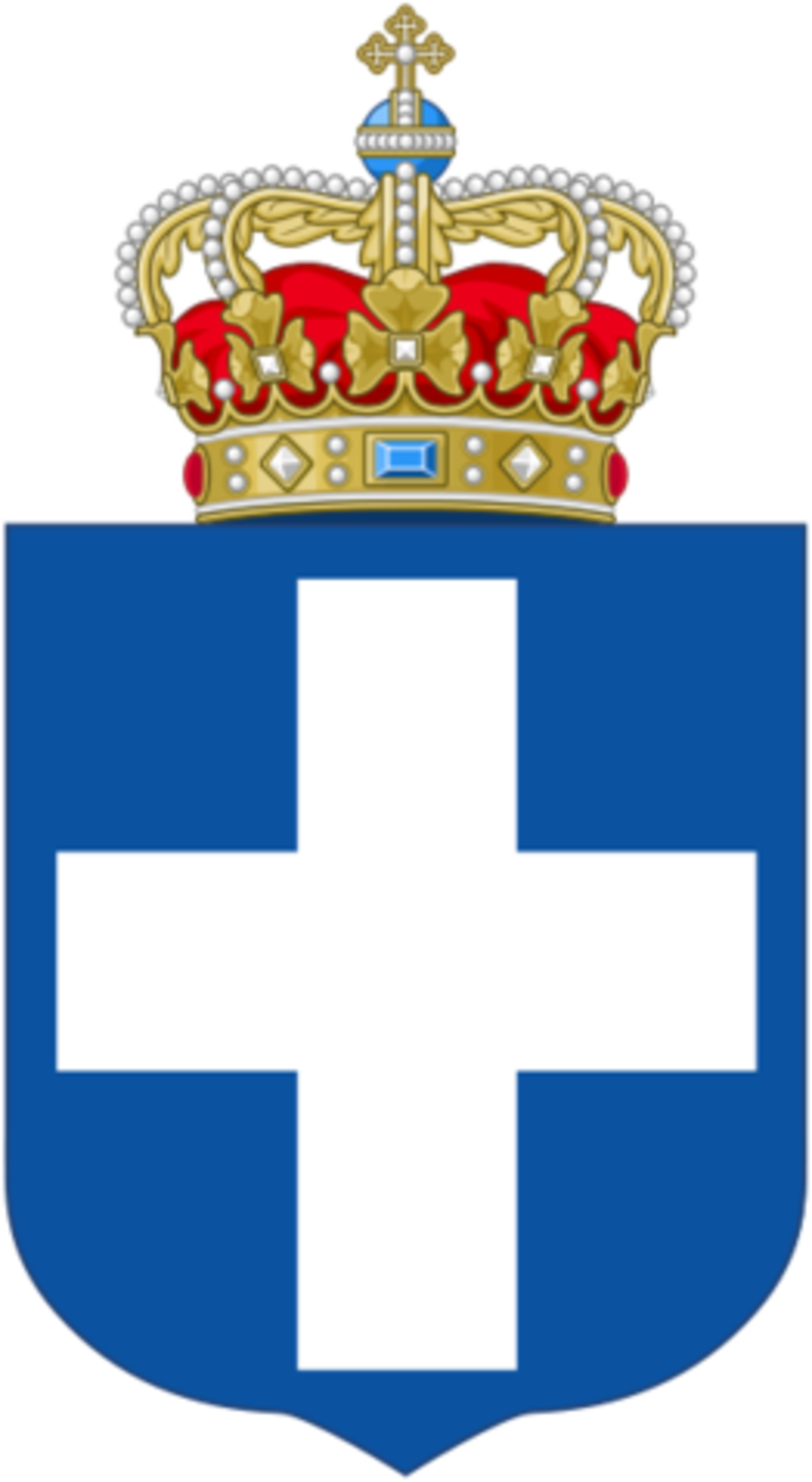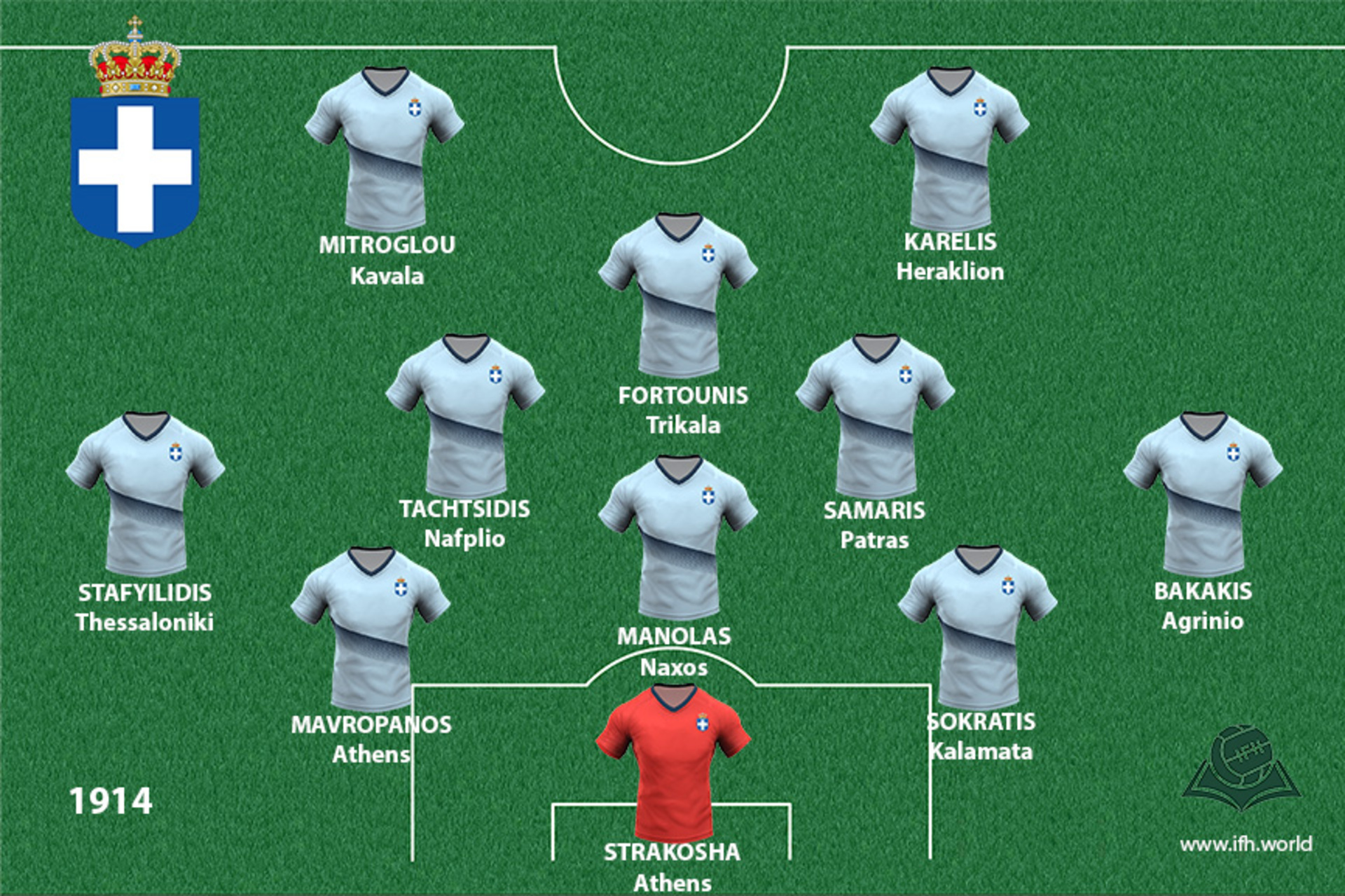Kingdom of Greece
Greece will begin foreign policy to pursue the idea of a Greater Greece (Megali Idea) that would encompass Istanbul, the Balkans, the Mediterranean islands and Asia Minor, presenting itself as the legitimate heirs of the Byzantine Empire, and the construction of Greek national identity based on a Byzantine past with Orthodoxy as its component part.

Coat of arms
Shirt
| Position | First name | Last name | Mjesto rođenja | Like | Dislike | |
|---|---|---|---|---|---|---|
| GK | Orestis | KARNEZIS | Athen |
1 |
1 |
|
| GK | Stefanos | KAPINO | Piraeus |
0 |
0 |
|
| GK | Thomas | STRAKOSHA | Athens |
1 |
0 |
|
| DC | Dimitros | SIOVAS | Drama |
8 |
1 |
|
| DC | Konstantinos | MAVROPANOS | Athens |
1 |
0 |
|
| DC | Kostas | MANOLAS | Naxos |
30 |
2 |
|
| DC | Kyriakos | PAPADOPOULOS | Katerini |
15 |
2 |
|
| DRC | Sokratis | PAPASTATHOPOULOUS | Kalamata |
25 |
6 |
|
| DLC | Marios | OIKONOMOU | Ioannina |
0 |
1 |
|
| DR/MR | Michalis | BAKAKIS | Agrinio |
0 |
0 |
|
| DLC/ML | Giorgos | TZAVELLAS | Athens |
0 |
0 |
|
| DL/ML | Charalampos | LYKOGIANNIS | Athens |
0 |
0 |
|
| DL/ML | Konstantinos | STAFYLIDIS | Thessaloniki |
9 |
6 |
|
| DMC | Dimitros | KOURBELIS | Dimitros |
0 |
0 |
|
| DMC | Panagiotis | TACHTISIDIS | Nafplio |
0 |
0 |
|
| DMC/DC | Aleksandros | TZIOLIS | Katerini |
0 |
0 |
|
| DMC/DR | Giannis | MANIATIS | Livadela |
0 |
0 |
|
| MC | Andreas | SAMARIS | Patras |
13 |
3 |
|
| AMRLC | Kostas | FORTOUNIS | Trikala |
23 |
10 |
|
| AMRL | Giannis | FETFATZIDIS | Drama |
0 |
0 |
|
| SS/FRLC | Anastasios | BAKASETAS | Corinth |
0 |
0 |
|
| FRLC | Christos | ARAVIDIS | Athens |
0 |
0 |
|
| FRLC | Dimitris | DIAMANTAKOS | Pireus |
0 |
0 |
|
| FRLC | Georgios | SAMARAS | Heraklion |
1 |
0 |
|
| FRLC | Nikos | KARELIS | Heraklion |
3 |
1 |
|
| FC | Efthymios | KOULOURIS | Skydra |
1 |
0 |
|
| FC | Kostas | MITROGLOU | Kavala |
18 |
2 |
Nevertheless, in the vision of Greater Greece, ancient archeological remains were used to prove the right to the territory. Greeks are beginning to use ancient Greece as an integral part of national identity, although modern Greeks, because of the overflow of Albanian and Slavic elements into the Greek mainland from the 6th century onwards, have nothing to do with the name of the ancient Greeks. At the end of the 20th century. Greece was catastrophically defeated by the Ottomans, resulting in a military coup in 1907 that ousted the national political scene of Eleftherios Venizelos, who knew that Greece could hope for the realization of its grandiose irredentist ambitions - essential economic modernization and political alliances.
Greece until the Balkan Wars 1912-1913. It managed to extend the state territory only to the territory of Thessaly, and then by its triumphs against the Ottoman Empire and Bulgaria its territory was increased by 70%. The great hopes fueled by the Balkan wars were destroyed by the schism that divided Greece during the First World War into two sharply divided and, at times, warring camps - supporters of Venizolis and supporters of the king.
Sources
- Darko DUKOVSKI, Povijest Srednje i Jugoistočne Europe 19. i 20. stoljeća , sv.I., Zagreb, 2005.
- Felipe FERNANDEZ-ARMESTO, Narodi Europe, Zagreb, 1997.
- Anthony D.SMITH, Nacionalizam i modernizam, Zagreb, 2003.
- Kristijan OBŠUST, ''Idealizovanje antičke Grčke klasičnog perioda kao „kolevke evropske kulture“. Stara Grčka kao univerzalni uzor za stvaranje modernih evropskih nacija'',http://www.journal.casca.org.rs/2012/12/24/idealizovanje-anticke-grcke-klasicnog-perioda-kao-kolevke-evropske-kulture-stara-grcka-kao-univerzalni-uzor-za-stvaranje-modernih-evropskih-nacija/
- Coat of amrs: http://althistory.wikia.com/wiki/File:State-Coat-of-Arms-of-the-Kingdom-of-Greece.png
